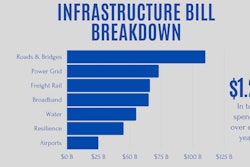
The Infrastructure Investment & Jobs Act (IIJA) is at a crucial turning point in Washington. The $1.2 trillion bipartisan legislation represents a once a lifetime opportunity to make transformative to invest in our failing roads, bridges, waterways and more, but it's fate is uncertain.
Currently, the outcome of the bill rests in the hands of the U.S. House of Representatives. When they return to work on Monday, September 20th, the lawmakers will have substantial work to do to get the legislation passed.
That's because progressive Democrats are insisting the IIJA be tied to a larger $3.5 trillion budget reconciliation bill which is facing massive backlash from both Republicans and Democrats.
Tomorrow, 9/15, is the deadline set by Senate Majority Leader Charles Schumer (D-NY) to have all the pieces of reconciliation ready to go from the House. But it’s hard to imagine Democrats going full speed ahead considering the barriers in place. Large divisions are building among moderate Democrats and progressives over the party’s two-part infrastructure strategy.
Two-Part Infrastructure Strategy
The passage of the $1.2 trillion bipartisan infrastructure bill rides on simultaneous passage of a reconciliation bill. To pass the pricey $3.5 trillion reconciliation bill, party leaders will have to keep Democrats almost entirely united to be able to use the reconciliation maneuver successfully.
While the legislation was crafted on a bipartisan-basis in the Senate, it was passed back down to the house where the dynamics are very different. Moderates are eager to get the Senate-passed $1 trillion infrastructure bill to President Joe Biden’s desk, while progressives want to use the larger bill to make good on a handful of promises including combating climate change, expanding Medicare and immigration reform before taking final action on the narrower bill.
Progressives in the House have said they will not consider the smaller bipartisan package unless it is paired with the larger reconciliation bill.
Joe Manchin (D-WV) has been vocal in expressing his concerns over the reconciliation package. In a Wall Street Journal op-ed, Manchin called for Democrats to “hit a strategic pause” on their budget reconciliation plans. Manchin said he is worried about inflation and debt and said slowing down could give lawmakers more time to analyze the economic impacts of their spending plans. In a 50-50 Senate, and Republicans unified in opposition, Democrats can’t afford to lose Manchin.
Manchin is not alone in his concerns; a spokesperson for Kyrsten Sinema (D-AZ) recently reiterated that she will not support a package that costs $3.5 trillion.
Both Sinema and Manchin have urged the House to move the $1.2 trillion bipartisan bill separately.
Strong Forces Oppose IIJA
Still, if the bill passes in the House, it will need to pass again in the Senate before it can be signed by Biden. In the Senate where the bipartisan legislation was crafted, support for the bill is also waning due to Democratic tactics.
"Progressive Democrats in the House have said they will not support the infrastructure bill unless the Senate passes the broader infrastructure initiative," Jay Hansen, executive vice president of advocacy at the National Asphalt Pavement Association said during a member briefing. "This gives Republicans the argument of, well, if we support the Infrastructure Investment and Jobs Act, then we're clearing the way for this $3.5 trillion bill,"
Former President Donald Trump is also opposing the legislation.
"Many Republican members do not want to cross Donald Trump on this matter because it will invite a primary opponent in the upcoming election," Hansen adds.
Other forces opposing the legislation include House Minority Leader Kevin McCarthy, who has aligned aligned himself with Donald Trump to oppose the legislation. The House Freedom Caucus, the most conservative caucus on the Republican side in the House also is opposed to the legislation. Representative Marjorie Taylor Green has said she will run primary opponents and campaign against Republican members who support this legislation. And then there is the Democratic Club for Growth which is an anti-tax coalition, opposing the legislation.
Speaker Nancy Pelosi (D-CA) only has a four vote margin of Democrats and will need them all to support this legislation.
"Congressman Graves (R-MO), who is the Ranking Minority Member on the House Transportation Infrastructure Committee, told us that they see maybe as many as 40 Republican members who could break ranks and support the legislation," Hansen says. "But with the pressure that President Trump is placing on the Republican members, I think the number is probably a dozen to two dozen at the most. Again, if Pelosi loses three or four democratic votes, she's going to need Republican votes to get this bill over the hump."
What Happens if IIJA Does Not Pass?
Pelosi (D-CA) has agreed to vote on the IIJA in the House by September 27th. Three days after this date, the Federal Aid Highway Program expires.
"If don't get this legislation, we're looking at continuing resolution and temporary extensions for as far as the eye can see," Hansen says. "Right now, there's no Plan B. We're either going to have a bill if we get 217 yes votes in the House or we're not. That's all we're focused on right now. There is no Plan B."
Should debates in Washington draw out past the September 30th, a continuing resolution would be passed. A CR would not address our failing infrastructure or the cash shortfall of the Highway Trust Fund (HTF) is facing.
"There's not enough revenue coming into the Highway Trust Fund to support the ongoing payments," Hansen says. "What that means is that FHWA will have to manage the cash flow of the Highway Trust Fund, which means delaying payments to contractors. "If you do a project in the state, you submit the invoice to the state, the state submits the invoice to the federal government and there's an immediate transaction that occurs within 20 seconds. At some point, FHWA is not going to be able to reimburse the state quickly to pay you the contractor for the ongoing project. That will start out and maybe the delay will be a day, maybe two days. But as a problem drags on, and as more and more invoices are coming in when there's not enough money to pay those invoices, that is going to require the contractor to float the loan until they get paid from the state who gets paid from the federal government.
Delays in cash payments from the HTF could begin as soon as November. If the IIJA passes, it would immediately solve the HTF issue. Upon passage, it will transfer $118 billion from the Treasury’s general fund to the HTF – with $90 billion of this amount going to the HTF’s highway account.
"If we don't get this legislation done now, we may not see another opportunity like this until the next election of the next president, whoever that may be," Hansen says. "And that would be really sad because we've gotten to this point, and all we need is a yes vote for the bill."




















